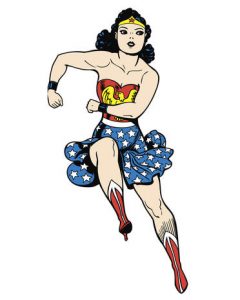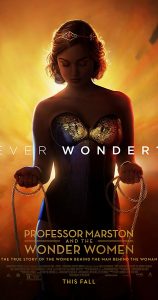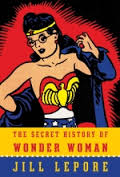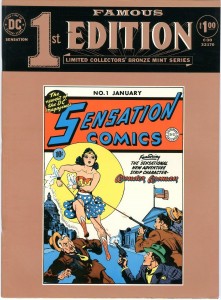 So I just got back from seeing Professor Marston and the Wonder Women, written and directed by Angela Robinson. I want to tell you why it’s a better Wonder Woman story than the one which starred Gal Gadot this past Summer, but I think I’ll start by explaining why the Gal Gadot film (actually, the Patty Jenkins film) disappointed me. I wrote this review the day after seeing that Summer blockbuster, but I didn’t publish it. It felt like I was spitting into the wind, because damn near everyone had declared that Wonder Woman (2017) was just the best superhero film ever–especially people who knew nothing about Wonder Woman and didn’t like superhero films.
So I just got back from seeing Professor Marston and the Wonder Women, written and directed by Angela Robinson. I want to tell you why it’s a better Wonder Woman story than the one which starred Gal Gadot this past Summer, but I think I’ll start by explaining why the Gal Gadot film (actually, the Patty Jenkins film) disappointed me. I wrote this review the day after seeing that Summer blockbuster, but I didn’t publish it. It felt like I was spitting into the wind, because damn near everyone had declared that Wonder Woman (2017) was just the best superhero film ever–especially people who knew nothing about Wonder Woman and didn’t like superhero films.
Now, though, presented with what I think is a far superior film about Wonder Woman, if not starring the character, I want to share what I wrote then. Tomorrow, I hope to share my reflections on Robinson’s film.
A Lifelong Wonder Woman fan’s response to Patty Jenkins’s film
(Consider yourself spoiler-warned right now. Don’t read this if you haven’t seen the movie and don’t want to know plot details.)
I love super heroines. Always have. Before I started reading comic books, the women of the Starship Enterprise fascinated me. A while back I wrote this tribute to the character I thought was Captain Kirk’s equal as an officer and an action-heroine.
Continue reading →
 So last night I saw this film, and on these very (virtual) pages said that it was the best Wonder Woman film of 2017. It was, because it communicated what the character was all about, which Patty Jenkins’s blockbuster starring Gal Gadot did not.
So last night I saw this film, and on these very (virtual) pages said that it was the best Wonder Woman film of 2017. It was, because it communicated what the character was all about, which Patty Jenkins’s blockbuster starring Gal Gadot did not.


